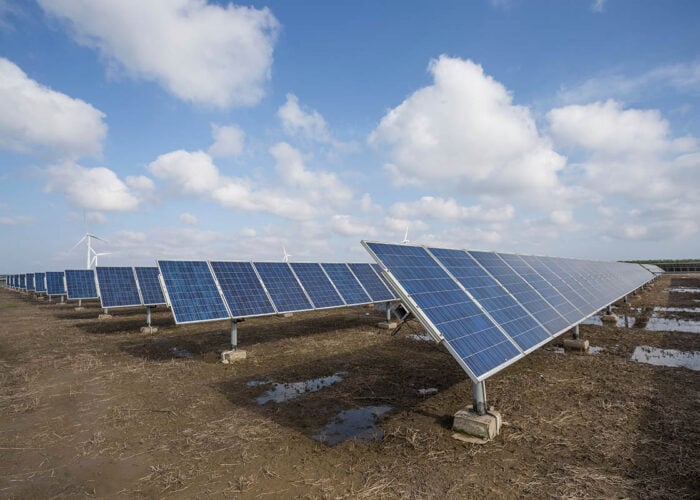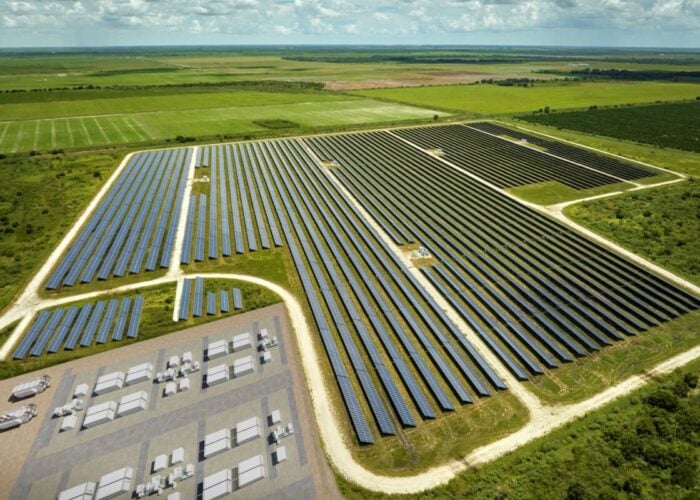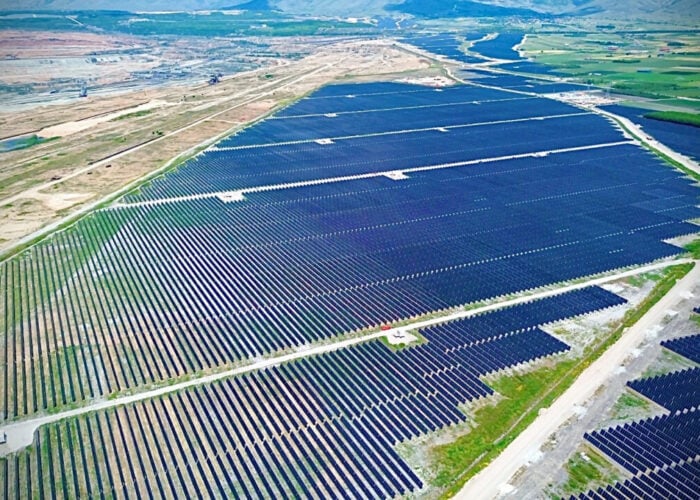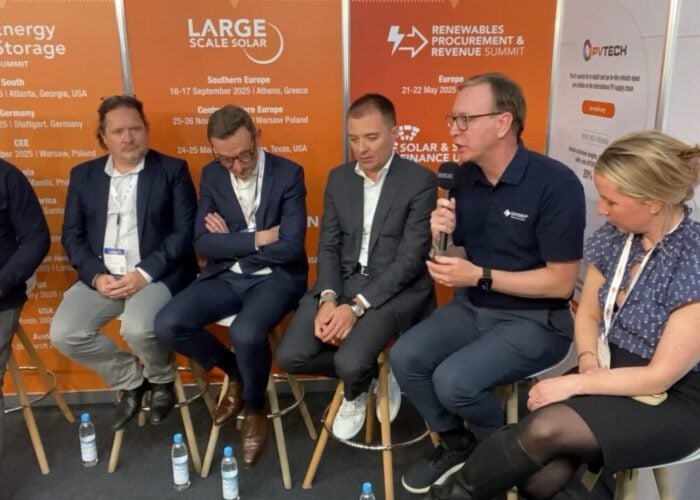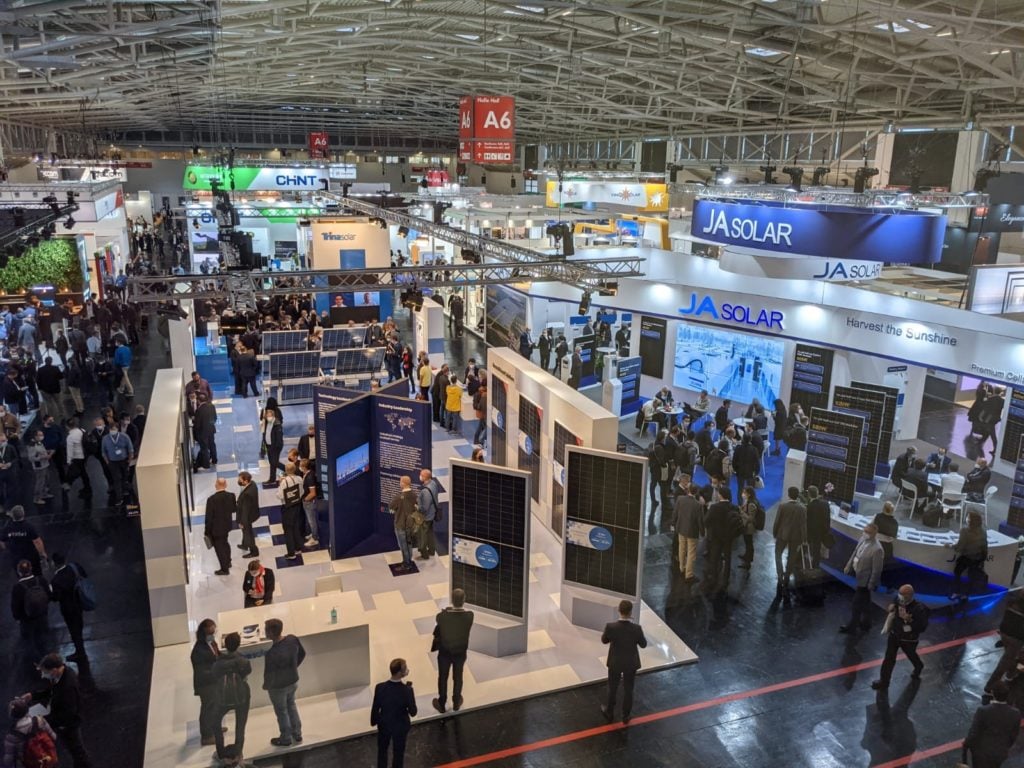
Hello and welcome to PV Tech’s coverage of day two of Intersolar Europe 2021. Thousands of visitors have returned to the Messe München for the second day of Europe’s largest solar exhibition, and PV Tech’s editorial team is reporting live from the event.
We have also collaborated with Intersolar Europe organisers Solar Promotions to publish a special edition of PV Tech Power to commemorate the show, which you can download entirely free of charge here.
Unlock unlimited access for 12 whole months of distinctive global analysis
Photovoltaics International is now included.
- Regular insight and analysis of the industry’s biggest developments
- In-depth interviews with the industry’s leading figures
- Unlimited digital access to the PV Tech Power journal catalogue
- Unlimited digital access to the Photovoltaics International journal catalogue
- Access to more than 1,000 technical papers
- Discounts on Solar Media’s portfolio of events, in-person and virtual
Storage in solar’s crosshairs
Solar needs storage and energy storage companies were a big presence at this year’s Intersolar. As well as a number of notable product launches, companies were excited about the potential for storage in Europe, despite mixed experiences when it came to delayed projects.
At one of the busiest stands at the show, Wattkraft, which distributes Huawei solar products in Europe, was showcasing its battery storage systems and inverters. While the company currently focuses on residential storage products, it intends to expand to commercial and industrial (C&I) and utility scale storage at the end of 2022. A Wattkraft representative told PV Tech that there have been no delays to its orders and contracts with clients so far, but they expect delays in Q1 2022 as the rising costs of projects start to cause more delays.
Sungrow was using Intersolar to boost its residential solar credentials. Until now, the Hefei, China-based company was solely focused on utility-scale storage. Now, however, it is setting its sights on the commercial and residential markets with a range of new inverters and storage systems for these settings. Meanwhile, it has switched to a liquid cooling system for its utility scale battery energy storage system (BESS), which technology support product manager, Hao Wu, said allowed for easier installation, lower costs and improved safety performance. Moreover, the spacing required between batteries that are cooled by liquid is only 150mm, compared with 2.5 meters for air, Wu added.
Spanish inverter producer Power Electronics, which has more than 25GW of annual production capacity, was displaying its suite of inverters and EV chargers. It has seen a number of orders pushed back as clients delay their projects due to module price hikes. Its project technical manager, Valeria Ezeta, said that smaller projects were much more likely to be postponed and that the company was managing the negotiations with clients well. Power Electronics was not offering any discounts on price in order to speed up the deals, she added.
There were also a number of big storage product launches at the event, with lots of companies keen to capitalise on the face-to-face interaction with delegates.
Notably launches include inverter manufacturer GoodWe showing off its Lynx HT Series utility-scale inverter, which builds on the company’s previous two utility-scale products; Trina Solar had a soft launch of its utility-scale Elementa battery storage system, which it said could reduce companies’ capex costs by at least 5% versus the top 5 mainstream competitors; Dutch storage company Alfen presented its new Battery Elements system, which can store up to 400MWh and diverges from its usual container-based system; and Solis was beating the drum about its new Flexi-ONE Maxi inverter for residential use.
Despite the uncertainty surrounding delayed projects and rising cost permeating the conference, exhibitors were upbeat and confident about solar in Europe, especially those who dealt in smaller C&I or residential projects. Storage companies in particular were less worried about the rising costs of material and pressure up the supply chain. And rightly so – solar needs storage and the two were getting on just fine at Intersolar.
A more sustainable battery?
Fresh of the back of a listing on the Nordic Nasdaq, battery energy storage manufacturer Nilar is exhibiting its novel solution which allows for electrolytes to be effectively ‘topped up’, creating a battery with greater longevity and, ultimately, one that is more sustainable. The product is due to be rolled out next year.
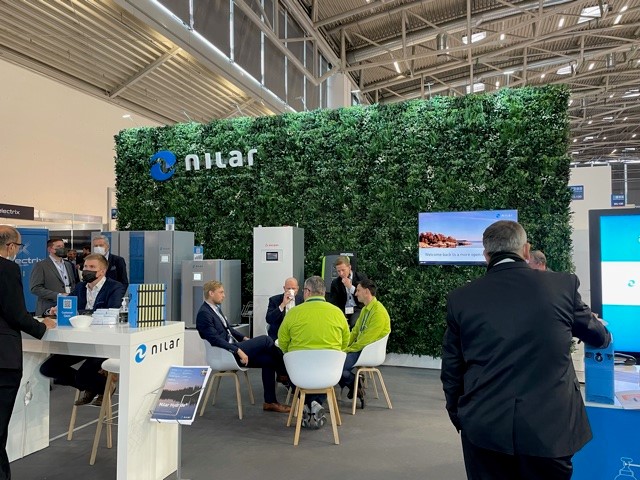
Sustainability and the circular economy has been another consistent theme at this week’s event, with much talk around how the solar industry must continue to improve on its carbon footprint by assessing end-of-life options and recycling.
Inside SolarEdge’s holistic energy approach
While the industry will most commonly associate SolarEdge with inverters, it’s investments in and product launches around energy storage, electric vehicles and software solutions are establishing the company as a more rounded solutions provider. A holistic vision of the direction of travel for the industry is behind this, CMO Yogev Batak told PV Tech earlier today, with the added benefit for installers of having one port of call for any potential issues rather than a collection of separate manufacturers.
SolarEdge’s booth at Intersolar demonstrated the full suite of residential energy products the manufacturer now has as its disposal, ranging from optimisers to EV charging solutions and energy storage products which began shipping to Europe recently.
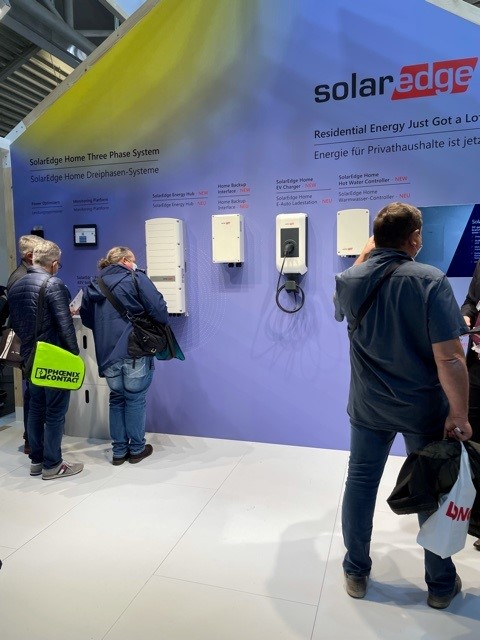
Barak added that by having a fuller suite of products, installer training and onboarding practices were being adapted to reflect that. The company has increased the amount of training offered to installers and bolstered this further with the Edge Academy.
FIMER: Made in Europe is resonating with customers
Italian inverter manufacturer FIMER said an increasing number of its customers were stressing the importance of buying products made in Europe as supply chain constraints show no sign of abating.
Issues with the solar supply chain, be it the pricing of materials and components or shipping and logistics constraints, have dogged the solar and energy storage industries for much of the last nine months and in recent weeks have escalated further. This pressure is now being faced by downstream developers and EPCs, with talk of significant numbers of projects facing pushbacks rife on the show floor.
Speaking to PV Tech earlier today, FIMER executive chairman Filippo Carzaniga said more and more customers were turning to his company for supply as a direct result of supply chain hurdles, especially those in Europe’s utility-scale PV segment.
The notion feeds into another emerging theme at this year’s show of a European solar manufacturing renaissance, which certainly appears to be gathering pace.
Maxeon backing Air module to capture Europe’s rooftops
While the company is not exhibiting at this year’s show, module manufacturer Maxeon Solar is backing its soon-to-launch Air module to capture Europe’s commercial rooftop market. The light weight module is geared towards rooftops that are unable to support the weights of more traditional solar systems, with Maxeon labelling the market as a multi-gigawatt opportunity.
Speaking to PV Tech today, chief revenue officer Mark Babcock said that the first shipments of the Air module are slated for Q1 2022, with some small pilot projects set to go ahead in the coming months.
Furthermore, Babcock said that while cells for the Air series will be made at the company’s facility in the Philippines, the module’s manufacture in France will ease some of the supply chain and logistics constraints currently being felt throughout the industry.
Trending topic: product diversification
Yesterday we covered news of Trina Solar’s energy storage product, and this is just one example of the kind of product and sector diversification which is highly evident on the show floor at Intersolar Europe this year. Manufacturers are frequently finding their feet in other markets, with one clear destination being energy storage, trackers and power-to-x products.
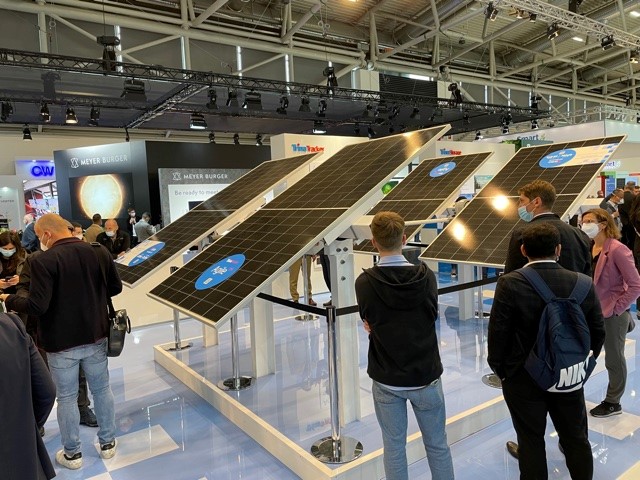
Day two kicks off!
Welcome back to PV Tech’s rolling coverage of Intersolar Europe 2021. After a frenetic opening day, the show floor is open once again.

